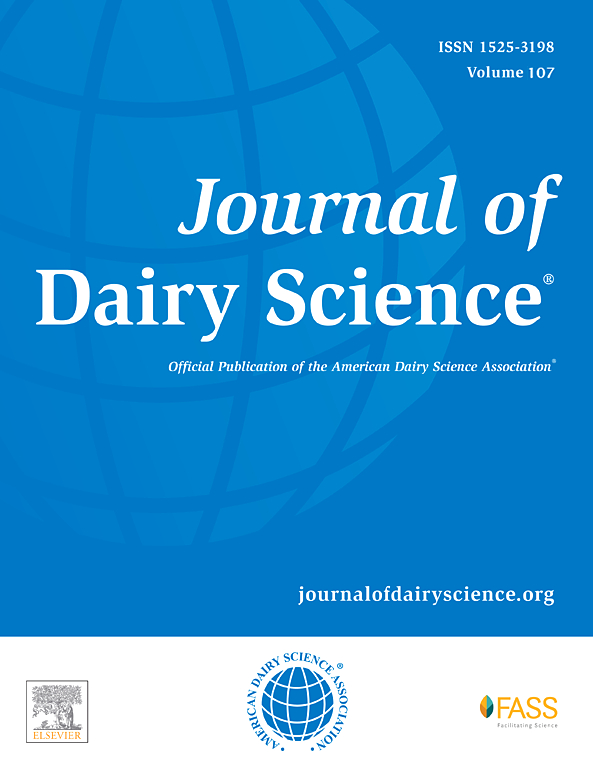Sociopsychological factors influencing Brazilian farmers' intention to regularize their cheese production
IF 3.7
1区 农林科学
Q1 AGRICULTURE, DAIRY & ANIMAL SCIENCE
引用次数: 0
Abstract
Milk and cheese products serve an important economic and social function in Brazil, as most of the production is carried out on small-scale family farms. Farmers who fail to meet institutional and market requirements related to production scale and milk quality often abandon the activity or turn to selling raw milk or unlicensed cheese. In this research, we adopted the theory of planned behavior (TPB) as a theoretical framework to investigate unlicensed farmers' intention to regularize cheese production. Interviews were conducted on site with 286 cheese producers in Paraná and Minas Gerais States, Brazil. The data were analyzed using descriptive statistics, regression analysis, and structural equation modeling—the procedures recommended in the TPB. The results were discussed based on the TPB and Brazilian institutional and market characteristics. Farmers' intention to regularize cheese production was positively correlated with social characteristics (farmer's age and experience in dairy farming) and farm characteristics (milk or cheese production area and milk volume). The construct perceived behavioral control (PBC) was the most important in determining cheese producers' intention to regularize cheese production, followed by the construct subjective norms (SN). The high importance of the PBC construct suggests that farmers believe they have sufficient capacities to regularize cheese production. The importance of the SN construct suggests that people close to farmers would support the regularization of cheese production. The attitude (ATT) construct was not significant in determining farmers' intention. The lack of significance of the ATT construct on farmers' intention indicates an absence of perceived incentive for licensing. The model defined by SN and PBC explained 24.9% of farmers' intention to regularize cheese production.
影响巴西农民奶酪生产规范化意愿的社会心理因素。
牛奶和奶酪产品在巴西具有重要的经济和社会功能,因为大部分生产是在小规模家庭农场进行的。无法满足与生产规模和牛奶质量相关的制度和市场要求的农民往往放弃生产活动,或转而销售生奶或无证奶酪。在本研究中,我们采用计划行为理论(TPB)作为理论框架来研究无证农民规范奶酪生产的意图。现场采访了巴西帕拉纳州和米纳斯吉拉斯州的286家奶酪生产商。使用描述性统计、回归分析和结构方程模型对数据进行分析- TPB中推荐的程序。基于TPB和巴西的制度和市场特征对结果进行了讨论。农民规范奶酪生产的意愿与社会特征(农民的年龄和奶牛养殖经验)和农场特征(牛奶或奶酪生产面积和产奶量)呈正相关。构念感知行为控制(PBC, 0.43)是决定奶酪生产者规范奶酪生产意愿的最重要因素,其次是构念主观规范(SN, 0.23)。PBC建设的高度重要性表明,农民相信他们有足够的能力规范奶酪生产。SN结构的重要性表明,与农民关系密切的人会支持奶酪生产的正规化。态度(ATT)构念对农民意向的影响不显著(0.10)。农业贸易总协定结构对农民意向缺乏意义,表明缺乏对许可的感知激励。SN和PBC定义的模型解释了24.9%的农民规范化奶酪生产的意愿。
本文章由计算机程序翻译,如有差异,请以英文原文为准。
求助全文
约1分钟内获得全文
求助全文
来源期刊

Journal of Dairy Science
农林科学-奶制品与动物科学
CiteScore
7.90
自引率
17.10%
发文量
784
审稿时长
4.2 months
期刊介绍:
The official journal of the American Dairy Science Association®, Journal of Dairy Science® (JDS) is the leading peer-reviewed general dairy research journal in the world. JDS readers represent education, industry, and government agencies in more than 70 countries with interests in biochemistry, breeding, economics, engineering, environment, food science, genetics, microbiology, nutrition, pathology, physiology, processing, public health, quality assurance, and sanitation.
 求助内容:
求助内容: 应助结果提醒方式:
应助结果提醒方式:


